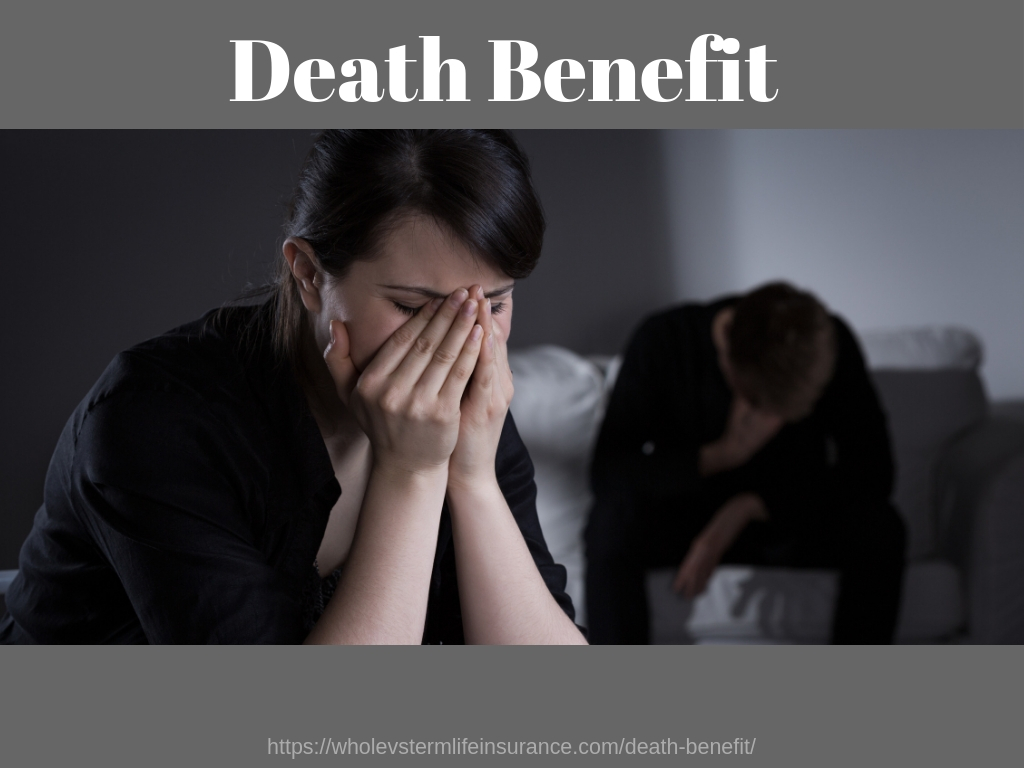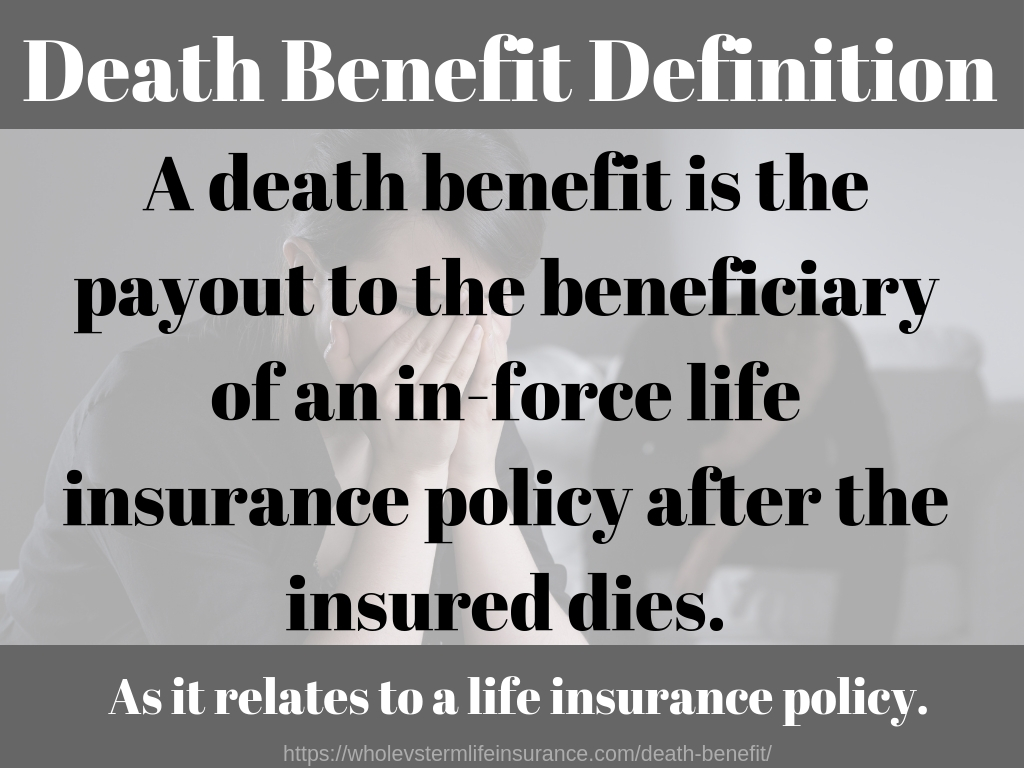The Death Benefit is a contractual obligation of the insurer to pay out upon the death of the insured.

A death benefit is the payout to the beneficiary of an in-force life insurance policy after the insured dies. Death Benefits can also pay out in certain situations when an annuitant dies or other contractual insurance obligations are met.
Death Benefit:
The concept of the death benefit is quite simple. When the insured of an active insurance policy dies, the insurance company has the obligation to pay out the face amount of insurance. This face amount can be set or changeable depending on the type of contract held.
The term death benefit can also be referred to as the DB or simply the benefit amount. The term 'Face Amount' is similar in nature. It refers to the initial coverage amount of a policy. With some types of life contracts (whole / universal) the face amount can grow a higher death benefit.
Technically speaking with life insurance contracts the person insured does not need to die to receive the full amount of the death benefit. Most whole life contracts have an end date of the contract, often aged 121, when the contract will pay out in full. This is not the case for term insurance.
The term death benefit can also have a slightly different definition when used with social security. For the purpose of this article we are referring to the death benefit for life insurance purposes.
The Definition of Death Benefit:
A death benefit is the payout to the beneficiary of an in-force life insurance policy after the insured dies.

The Death Benefit - What you Need to Know:
All death benefits are listed on the insurance policy. It is one of the most important pieces of information on the face of any insurance contract. When shopping for term or whole life insurance it is the amount of coverage.
Caveats to Death Benefit Payouts:
See the section below. Know that it is pretty rare for a life insurance contract not to get paid out. The most common issue is lack of policy being up to date on yearly premium and the two year suicide exclusion.
Taxation of Death Benefit Payouts:
Generally speaking Death Benefits from an individual life insurance policy is federal income tax free. There are exceptions to this, but they are pretty rare.
Life insurance policies though are NOT always excluded from federal and state inheritance and estate taxes. Although still rare, it is important to note that you will want to speaak with your tax adivsor when you receive a death benefit payout,
How Death Benefits are Paid out:
The beneficiaries of life insurance policies typically have the right to select from one of numerous forms of payout. Depending on the type and kids of insurance, consumers can often choose one from numerous settlement options. Some of the more popular settlement options include:
Caveats to the Payout of Death Benefits:
Unbeknownst to many consumers there are several caveats to death benefit payout. Many of these are so rare as to be an issue that their inclusion in my list may seem absurd. For the vast majority of life insurance contracts the major hurdle is that the policy is in good standing and current on its bills.
Policy in Good Standing:
Yes you have to pay your policy in order to have the death benefit paid out. Failure to pay your life insurance bill can result in non payment of the DB.
Incontestability Period:
If insured dies within the first two years of the policy, death from Suicide is typically not paid. Other than that the policy is often reviewed a bit more, before the death benefit is paid out. These are some of the basics of the incontestability period.
Material Misrepresentations:
This seems really obvious, but it is worth noting. If you intentionally lie on your life insurance application and the information that you lie about leads to life insurance approval that you would not have received than its possible that you policy might not pay out.
Excluded LIst of Causes:
This is much rarer than it once was. But some life insurance policies carry exclusions to the case of death they will pay out on.
An example of this is the Military Death Exclusion death clause. Obviously if you are in the military you would not want clause in your policy. More an more insurers are removing this clause.
In our history HIV was at one point excluded from payout on certain policies. This no longer the case and is not a problem moving forward with most US policies.
Illegal activities: this potential exclusion is not intended for common red light runners, rather bank robbers. If you rob banks and get killed its possible that you insurer may refuse to pay out a death claim.
Living outside of the United States: Again, not common but it is possible that if you move outside the United States and you were to die your life insurer (if the contract stated this) could refuse the payout.
Notification:
The Insurance company will need to be notified. Increasingly insurers are scanning public records about the deaths of insured, but... this does not always happen. It is a best practice to contact the insurer and inform them of an insureds death. For your own protection I recommend this to anyone who family member has died with a life insurance policy.
Governmental Financial Enforcement Action:
If you used ill gotten gains and funneled them into a life insurance policy, I would not necessarily expect that your beneficiaries will be able to keep those monies. Certainly a court case would be involved. This caveat is incredibly incredibly rare, but it is worth nothing.
It is also foreseeable that an insurance death benefit claim could not be paid out in a Terrorism case. American insurers are not allowed to transmit money to known terrorists. What exactly would happen to that payout is hard to say.
Another subset of this are the so called Slayer Statutes that will not allow a killer to receive the death benefit themselves from someone that they themselves killed.
Loans Will Reduce the Payout:
Any money taken out as a loan will reduce the face value of the policy, per the language in the contract.

Questions About Death Benefits:
Question: Can debts of the owners be subtracted from the death benefit amount?
Answer: Typically unless the debt is part of the insurance policy and /or unless the beneficiary agreed to be a cosigner of that loan than the death benefit is free and clear from the owners debt. Of course this case specific. See your tax adviser.
Conclusion of this Article:
Thank you for Reading our article about a crucial definition for life insurance. Should you have any questions please feel free to contact us at any time.



 Speak with an experienced advisor!
Speak with an experienced advisor! 
